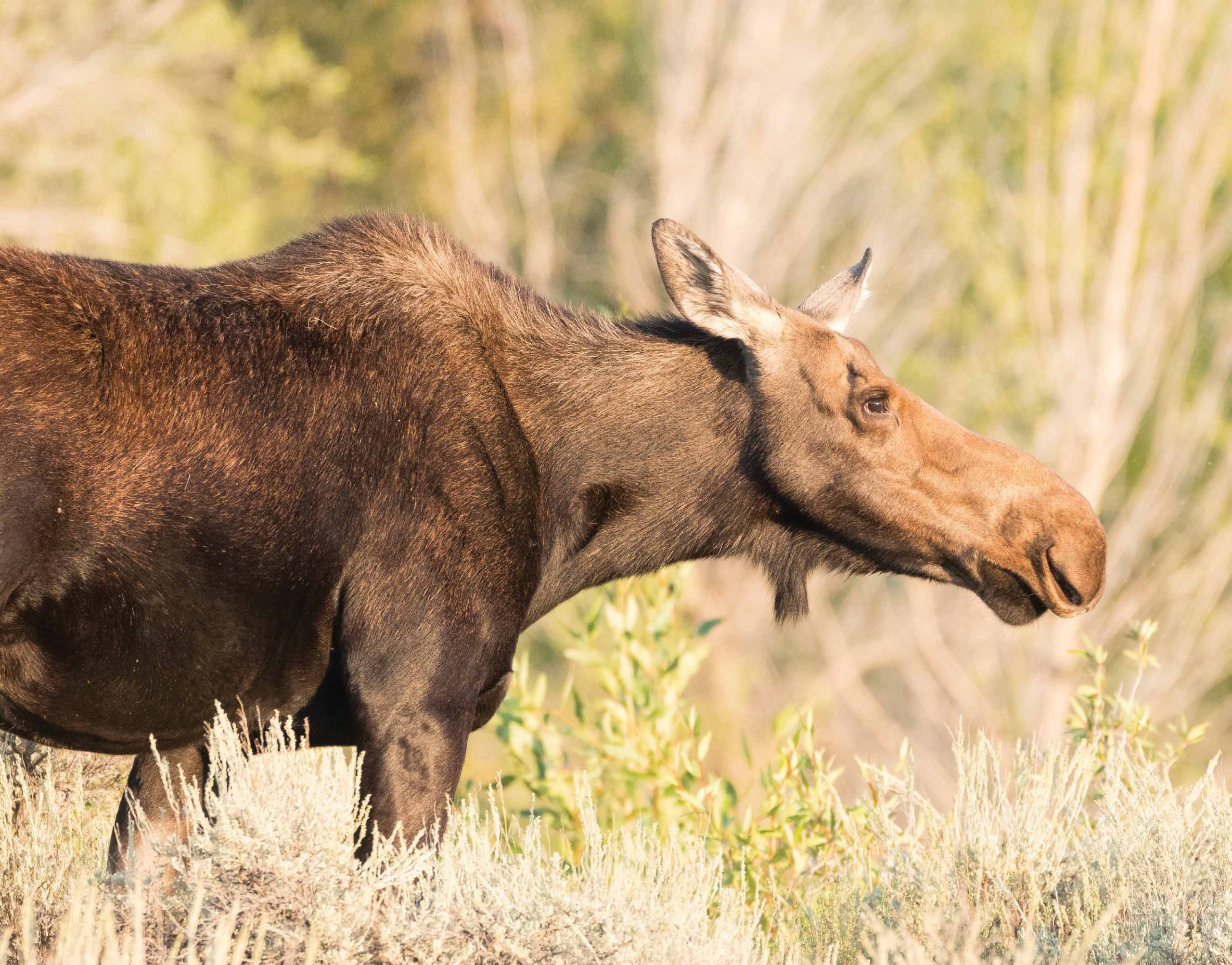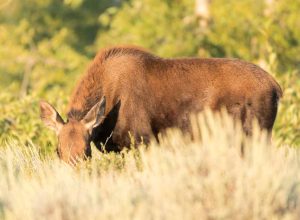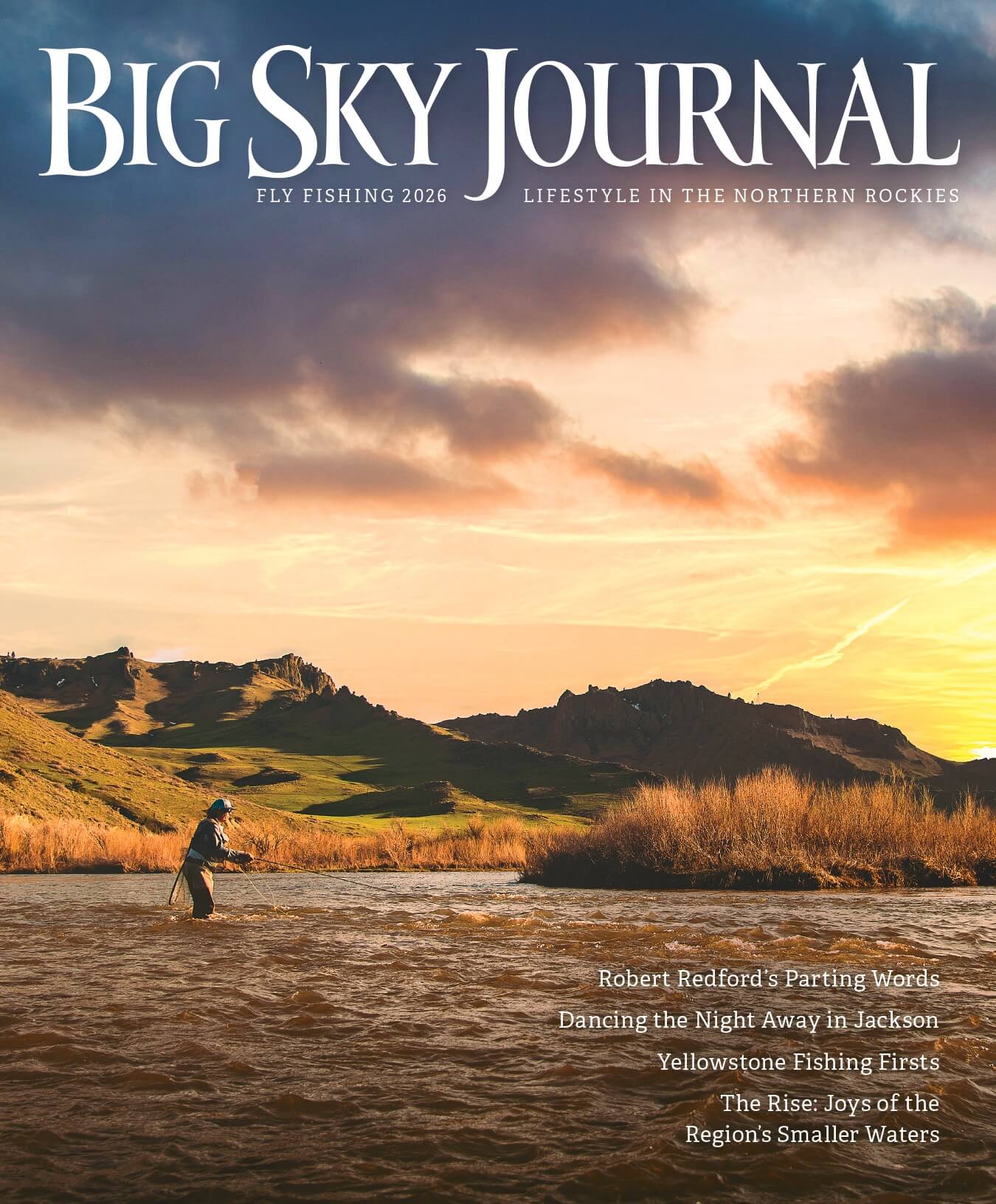
01 Aug Outside: The Moose
Oh, how the waters curve and jump — fringed with willows, flickery with trout — between a big wilderness and a small town. That’s the creek, the place where I spend much of my free time. I suppose you could refer to it as a hobby — wandering around, staring at stuff — but hobby connotes goals, projects, the last piece of balsa wood glued to a model airplane. My devotion to the creek is fundamentally aimless: Expecting nothing, I always discover something.
Given this nothing-something pattern (a strange lichen, a new spider web, a hawk’s molted feather), I was both surprised and totally unsurprised to find myself pausing midstep on a random September afternoon, ears pricked. First, the sound of branches bending and breaking. Second, the sound of lips stripping leaves. Third, the sound in my head, a soft voice humming moose-moose-moose-moose.

Photo by KYLE MOON
Standing too near? Breathing too heavily? Introductions with dangerous megafauna can be awkward, but they’re necessary and exciting, rich with potential. A glimpse was the extent of our encounter, a fleeting view of a furry shoulder, yet some conversation was initiated, some ball set rolling. Falling asleep that night, I saw the cow moose at the edge of a dream, sloshing through the eddies of my unconscious mind.
I saw the cow moose three days later, too. And the day after that. And four days in a row the following week. By then, she was familiarly unfamiliar, which is to say our paths intersecting had become less of a shock than the sheer improbable abundance of her, the gangly graceful weirdness, the feeling that my senses were a bottomless reservoir and Alces alces could be poured into me forever.
I know: fluffy nature-boy talk. Guilty as charged. But how else to describe a session together in the slanting sun, in gray rain? How else to explain such enthrallment?
It went on like this for a month, me and the moose and the glinting, thinning, running-toward-winter creek. All told, I spent perhaps 15 hours beside her, just sort of minding my own business. Studious observation, a left-brained analysis of morphology and behavior, didn’t matter in the least. What mattered was a raw presence, the unadulterated now. I wanted to be close, to share the light and shadow, the weather, the season turning in this watershed that — without forming the word — we both called home.
Home. Does anybody have a clue what the word signifies, what it really means?
I once read an interview with Jane Hirshfield in which the poet likened Zen practice to sitting quietly in the woods: “After a while, the animals begin to emerge, and you see the full amplitude of life that is already there.” Of course, Hirshfield’s “animals” are the sensations, emotions, memories, fantasies, and fears that consciousness meets during meditation. The metaphor can be taken literally, though, and thus serves as a reminder that our species is situated in an ecosystem — a neighborhood — of fellow creatures. Even when we are seemingly alone, it turns out we are far from it.
The final time I saw my cow moose, I mostly didn’t. We were together on a Saturday, ungulate meandering and munching along the north side of the creek, human sipping a beer and strolling to the south. Slowly, serenely, my attention strayed and returned, strayed and returned, traveling from the dark horizon of her spine to a distant slope’s trembling aspens, from the gargantuan goof of her muzzle to hovering insects, drifting clouds, the landscape’s innumerable details.
Then I noticed the willows rustling 20 feet away, the brown flank and rump disappearing. She laid down, and, in imitation, I did the same. Like that, together but apart, another hour passed. Dusk drew itself across the valley. Neither of us budged.
Lying supine, stars starting to prick the purple sky, I considered how easy it would be to miss a hidden moose, to remain oblivious. I considered the classic truism about mountain lions — that they watch you for years, for decades, before you ever see them. I considered Hirshfield’s phrase: “Life that is already there.”
Between a big wilderness and a small town — oh, how the waters curve and jump and jump and curve. Nothing’s out there. Something’s out there. At a certain point — a point that is not a point at all, but rather a kind of blessing — these distinctions become ridiculous, untenable, and you’re left gazing, listening, keeping company with the world.
At home?
For lack of a better word, yes — at home.
Leath Tonino is the author of two essay collections about the outdoors, most recently The West Will Swallow You. A freelance writer, his work has appeared in Orion, The Sun, Adventure Journal, Outside, and elsewhere.




No Comments